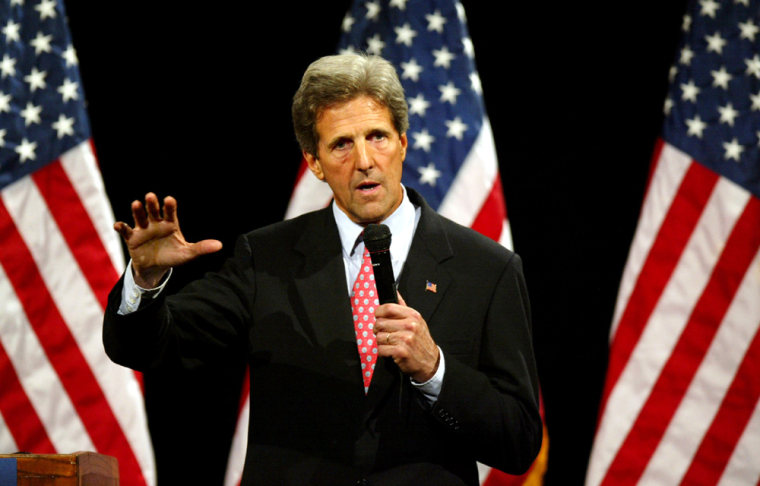In the world of politics every disciplined and well-managed candidate has a message he or she seeks to highlight at any given time.
For John Kerry, the official message this week has revolved around the rising cost of healthcare and his plans to deal with it. And, in the controlled world of campaign politics, Kerry has stuck to that message like gum to the bottom of a shoe. From Pennsylvania to Kentucky to Florida, the senator has assured voters he is the man to solve their healthcare woes.
Unfortunately for Kerry, from the Atlantic to the Pacific the official message wasn't so easy to manage, the nation's political dialogue being driven by lesser-controlled entities than a presidential campaign.
So while the presumptive Democratic nominee talked healthcare, much of the nation — and certainly the national news media — was focused on the Iraqi prisoner abuse scandal and its repercussions. That disconnect has some Democratic observers worried.
Off subject? Missed opportunities?
In many of the nation's newspapers and television talkshows, observers have been wondering whether Kerry is too stuck on message -- and thus missing opportunities to capitalize on the President Bush's troubles, especially in Iraq.
This was the case last week as well as this week as dramatic images from the Abu Ghraib prison seemed to put the administration on the ropes.
Not only was Kerry busy laying out his plan to address the rising costs of healthcare as Bush made his visit to the Pentagon on Monday, but as the pictures documenting the abuse of Iraq prisoners first dominated the television airwaves last week, Kerry spent three days highlighting his education initiatives.
Similarly, just as the commission investigating the Sept. 11th terrorist attacks was convening in late March to take the testimony of current and former government officials, including Condoleeza Rice and Richard Clarke, Kerry was touting his economic message.
For his part, the Massachusetts senator dismisses any notion that his message isn't providing the necessary traction or that he is wasting opportunities.
Speaking to AP radio Kerry noted, "People are deeply concerned about what makes America strong here at home. And obviously the quality of your healthcare, the quality of your schools, the types of jobs people have; these things matter to people every single day. So yes, we're all interested in what's happening in Iraq. But life goes on, and people realize that we've got to make America strong here at home."
Martha Joynt Kumar, a political science professor at Towson University who specializes in presidential communication, said it's hardly surprising that Kerry would focus on healthcare and education, even at a time when so many Americans are fixated on Iraq.
Not grabbing headlines with education initiative
Despite his declining poll numbers, Kumar noted, Bush's strength remains on issues involving his leadership during the war on terrorism, while the Democrats' traditional strong suit is with domestic issues like health care and education.
Kerry "wants to talk about the issues that will be important to his campaign," Kumar said. "Why should he talk about something that will benefit Republicans?"
Because, as some members of the national media are quick to point out, without talking about the war on terror or the national security matters that have dominated the news for the past three months, Kerry is unlikely to grab a headline and thus be forgotten by voters.
However, that too is a notion Kerry's campaign is quick to dismiss.
Campaign spokesman David Wade pointed out that while it is "frustrating that sometimes the national media doesn't seem to be able to hold two issues in the balance at once," polls reflect that Kerry's strategy is in fact working.
One reason for that could lie in the political viability of what Kerry is highlighting.
Despite the president's best efforts, education — in particular the No Child Left Behind Act — and healthcare, in particular Medicare reform, remain hot topics for voters on both sides of the political spectrum and Kerry has used both issues to fire up the Democratic base as well as lure moderate conservatives to his camp.
Secondly, Kerry does speak to the media, but his focus as he travels the country is largely on local outlets and he succeeds in grabbing local headlines during his visits to key battleground states, regardless of what he is talking about.
For example, on Wednesday, Kerry did address the Iraqi prisoner abuses, the war in Iraq and the war on terror in at least two radio and two local television interviews. It's a pattern the Kerry campaign believes in and intends to continue until voters head to the polls in November.
And as for those critics, Wade pointed out that "the history of second-guessing of presidential campaigns is equally as long as presidential campaigns themselves."
